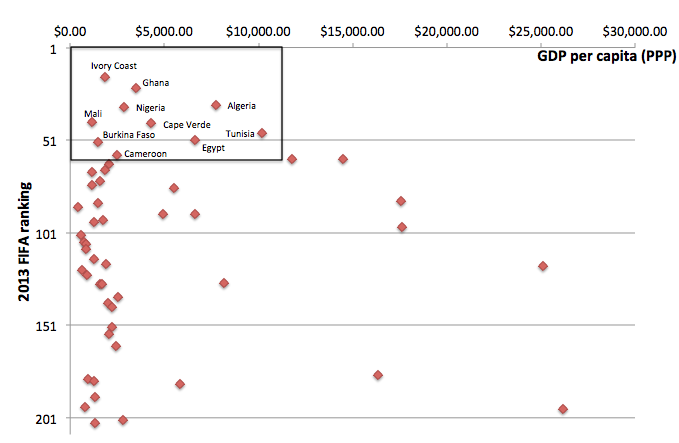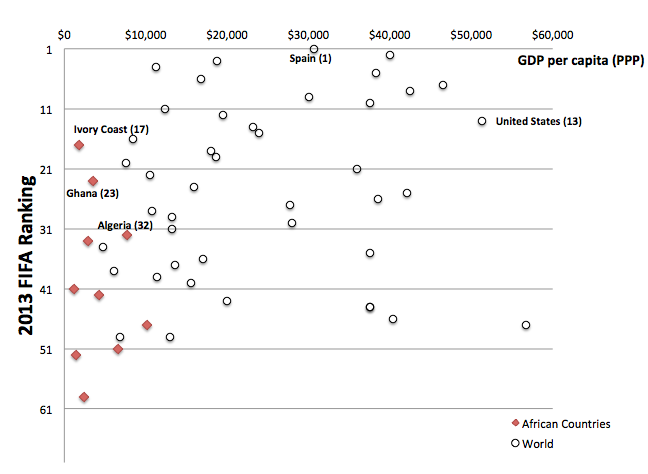By Robert Weaver
Updated by Morganne Gagne
African soccer is dominated by one important reality: A paucity of financial resources when compared with the dominant soccer nations of the world. The facilities and infrastructure necessary to build a soccer program are simply not available throughout most of Africa. South Africa has the largest GDP of any African nation and it is only ranked 61st in the world [1]. The vast majority of the top-ranked soccer nations have a much larger GDP than South Africa. And South Africa is not even truly representative of African soccer. The Ivory Coast and Ghana are 157th and 143rd in GDP per capita [2]. However, GDP cannot be considered an indicator of a nation’s soccer success. The graph below plots all African countries’ 2013 FIFA rankings vs. their GDP per capita (PPP), and there does not exist a strong correlation between the two. Ivory Coast is currently has the top-ranked national team, but it is, by no means, the wealthiest country on the continent.
When compared to the rest of the world, African soccer teams fare surprisingly well considering their lack of resources. Ivory Coast and Ghana have the lowest GDPs per capita out of all teams in the Top 25 and rank 17th and 23rd respectively [3]. Compare that to a country like Norway, ranked 47th, despite having a GDP per capita over 30 times greater than that of the Ivory Coast. Despite the lack of organization, soccer is an extremely popular sport in Africa, and according to African soccer expert Paul Darby, African teams have “emerged as credible challengers to the pre-imminence of South America and Europe.”[4] It has been a truly remarkable accomplishment for nations like Ghana, Nigeria, and the Ivory Coast to make an impact in large international tournaments, but the success of these national teams has done little to build the infrastructure of the game at home. Rather the successful players from these nations leave at an early age to ply their trade in Europe. The leagues of England, France, Spain and many others benefit from the talents of these African footballers, but their homelands receive very little monetary benefit. The challenge for African soccer in the future will be to find a way to capitalize on the talents of their players and reap the benefits of producing such world class talent.
Click here to go back to the main “Africa” page.
How to cite this article: Robert Weaver, “The Economics of African Soccer,” Soccer Politics Pages,http://sites.duke.edu/wcwp (accessed on (date)).
[2] October 2013 FIFA Rankings
[3] The world’s richest and poorest countries
[4] Darby, Paul. “Africa Football and Fifa: Politics, Colonialism and Resistance.” Frank Cass: London. 2002. Pg. 1



Thank you for your suggestions and comments. These pages were written by Duke students in the Fall of 2009, but I hope to update and improve them when I teach my class again and these suggestions will be helpful!
Please check some of your information before making them public when you talk about soccer in Cameroon and other African countries. The last time I checked, your main sources of reference, the CIA factbook is not the best source to talk about football or just some countries. You want to make a research about such an important topic, please give yourself a chance to search and ask around. When you talk about 2nd division league in Cameroon, you failed to mention that each province or Region has its own 2nd division league and that at the end of the season there is a national competition (Inter Poules) where the 3 top teams clinch a spot into the national league.
Camfoot is a nice site but again they give personal comments instead of sometimes just stating facts. You can not talk about soccer in Cameroon while ignoring that the FECAFOOT, the national football association has a website where you could get more information and get in touch with people who could have gave you better information.
I like the topic, I enjoy the work or Pr Laurent Dubois but really, when going specific about a topic, you got to get your facts right.